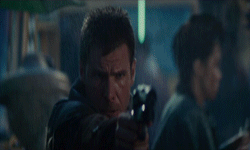What is the true meaning of being human? What is it that separates us from animals, or better yet, machines? These are the questions that lie at the heart of the 1983 epic Blade Runner. Blending the technology and adventure of science fiction and the existential ennui of film noir the film relates a tale that is truly out of this world. At once a fantastic vision of the future and a dire warning for the present the film acts as an ode to the human experience and raises questions that will have you thinking long after its final credits fade. Party like its 2019 with Blade Runner.
The story begins in a dystopian vision of the year 2019 in which Earth has decayed into an urban wasteland following a nuclear war. The seedy streets of Los Angeles are populated with world weary humans and their automated counterparts known as Replicants. The Replicants are virtually identical to humans but possess superhuman strength, a lack of empathy, an inability to control impulses, and a lifespan of just four years. After six replicants make a bloody escape from 'off world' and land on earth former detective or 'blade runner' Rick Deckard is forced out of retirement to capture and execute them before they can wreak further havoc. The Replicants then set out to locate the scientist who created them in hopes of finding a way to stave off their imminent expiration, with Deckard following their trail every step of the way. What should be a simple case is soon complicated when Deckard meets Rachel, a Replicant who was programmed to believe that she's actually human. As he forms a connection with her he finds himself questioning his mission and wondering if Replicants might be closer to human than he thought.While Blade Runner was uniformly considered a commercial and critical failure upon its release, the film has since gone on to achieve widespread acclaim, and its easy to see why. Even as it transports viewers to the future, the film offers vital warnings for the present. For example, through its depiction of the aftermath of nuclear conflict the film recalls Cold War fears while speaking to escalating global tensions that have resurrected the specter of nuclear apocalypse. Similarly, the film's questions regarding the ethical concerns regarding artificial intelligence could have been ripped from today's headlines. Twenty twenty-two alone has seen explosive developments courtesy of Elon Musk's Neuralink, the deployment of AI caregivers in South Korea, and even allegations that Google's artificial intelligence has become sentient. In the wake of such developments the distant world of Blade Runner seems not only possible but likely and frighteningly near.
Although Blade Runner's prescience ensures that it remains more relevant than ever, it is its exploration of the human experience that makes it truly timeless. Through its depiction of Deckard the film aptly portrays the toll that social isolation, moral decay, and trauma take. Rather than truly living his life Deckard goes from performing one assigned task to another, much in the same way as the Replicants he hunts. His gruff interactions with his colleagues and personal isolation also hint at an inability to relate to others that his automated counterparts could appreciate. After years of executing Replicants he has become desensitized to the violence surrounding him and lost any sense of the value of life. In short after years of working as a Blade Runner he has become little different from the Replicants he hunts. It is only when he finds an unlikely human connection with Rachel that he finally begins to think for himself and feel for others. Through its portrayal of Deckard's regaining of his humanity the film transcends both science fiction and noir by asking the vital question of what it means to be human and forces viewers to question if they are truly living or merely existing. Journey across the stars and into the depths of the human soul with Blade Runner.
The film transports viewers into its dystopian world thanks to the stellar work of its cast. Daryl Hannah expertly balances sensuality and vulnerability as 'pleasure model' Replicant, Priss. Brion James is appropriately menacing as Replicant strongman Leon. Joseph Turkel expertly portrays the callousness and hubris of the Replicants' creator, Dr. Tyrell. Edward James Olmos lends knowing humor as Deckard's enigmatic colleague, Gaff. Joanna Cassidy gives a heartbreaking peeformance in her brief appearance as runaway Replicant Zhora. William Sanderson aptly conveys the loneliness, and innocence of prematurely aging genetic engineer J. F. Sebastian. M. Emmet Walsh expertly depicts the sleaze of corrupt policeman, Lt. Bryant. Rutger Hauer steals each scene in which he appears as the rogue Replicants' charismatic leader, Roy. Sean Young turns in the best performance of her career as she balances Rachel's blend of Replicant cool confidence with aching vulnerability. Harrison Ford plays against type and earns his place in noir history as the morally conflicted Deckard.
In the decades since its release Blade Runner has earned its place in modern culture. Through its at once gritty and poetic script the film takes viewers on an unforgettable journey into a dark future while asking essential questions about our own present. The cast brilliantly bring the film's dystopian world to life through their multi-faceted performances. For a film that will make you think, feel, and long for those moments lost like 'tears in the rain' take the case with Deckard in Blade Runner.




No comments:
Post a Comment